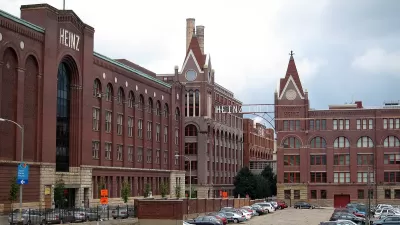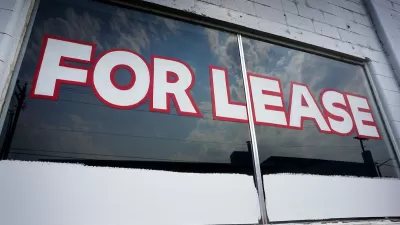Funding and zoning changes are likely necessary but insufficient on their own, to borrow a phrase from Nolan Gray. Pittsburgh hopes to deploy both to spur adaptive reuse in the city.

Pittsburgh is using $2.1 million in funding from the American Rescue Plan Act to fund a portion of a pilot program to make it easier to convert vacant or obsolete commercial buildings into housing. The reinvigorated focus on adaptive reuse in the Steel City is also made possible by a slate of zoning changes under consideration by the city in September. Adaptive reuse is a hot topic in 2022, as cities look to shift downtown land uses as significant numbers of downtown workers continue to work from home in the third year of the Covid-19 pandemic.
According to an article by Julia Felton, the zoning changes would remove the requirement for planning commission review for new residential development in the Golden Triangle area of the city. “The legislation also looks to change a requirement that all exterior renovations with a price tag of $50,000 or more earn Planning Commission approval. That piece of the zoning code dates back to at least 1983,” reports Felton. The new price threshold would be $250,000.
Felton also reported in July on the city’s planned using of American Rescue Plan Act funding for its adaptive reuse program, which was part of the OnePGH program launched by former mayor Bill Peduto.
FULL STORY: Proposed zoning changes would make it easier to convert unused Downtown office space into housing

Planetizen Federal Action Tracker
A weekly monitor of how Trump’s orders and actions are impacting planners and planning in America.

Congressman Proposes Bill to Rename DC Metro “Trump Train”
The Make Autorail Great Again Act would withhold federal funding to the system until the Washington Metropolitan Area Transit Authority (WMATA), rebrands as the Washington Metropolitan Authority for Greater Access (WMAGA).

The Simple Legislative Tool Transforming Vacant Downtowns
In California, Michigan and Georgia, an easy win is bringing dollars — and delight — back to city centers.

The States Losing Rural Delivery Rooms at an Alarming Pace
In some states, as few as 9% of rural hospitals still deliver babies. As a result, rising pre-term births, no adequate pre-term care and harrowing close calls are a growing reality.

The Small South Asian Republic Going all in on EVs
Thanks to one simple policy change less than five years ago, 65% of new cars in this Himalayan country are now electric.

DC Backpedals on Bike Lane Protection, Swaps Barriers for Paint
Citing aesthetic concerns, the city is removing the concrete barriers and flexposts that once separated Arizona Avenue cyclists from motor vehicles.
Urban Design for Planners 1: Software Tools
This six-course series explores essential urban design concepts using open source software and equips planners with the tools they need to participate fully in the urban design process.
Planning for Universal Design
Learn the tools for implementing Universal Design in planning regulations.
Smith Gee Studio
City of Charlotte
City of Camden Redevelopment Agency
City of Astoria
Transportation Research & Education Center (TREC) at Portland State University
US High Speed Rail Association
City of Camden Redevelopment Agency
Municipality of Princeton (NJ)





























